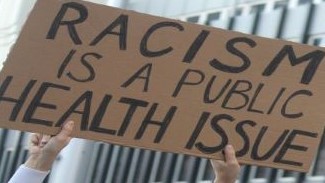Boston: Mayor Marty Walsh declares that racism is a public health crisis and redirects funding to strengthen city health programs in Black communities.
Kentucky: Governor Andy Beshear pledges to provide free health coverage to all of the state’s Black residents.
Congress: Senator Sherrod Brown of Ohio introduces a resolution that would declare racism a national public health emergency.
With focused attention on the Black Lives Matter movement, political leaders are finally waking up to what public health experts have known for decades: that systemic racism has caused an enduring crisis in the health of Black people in America.
New commitments by political leaders in a handful of cities and states are encouraging, but not nearly enough. How can communications professionals build on this momentum so that the current movement leads to lasting, permanent change?
For starters, it’s critical to view systemic racism though the lens of public health and that requires understanding health equity. Equity in this case is about the opportunity for all people to attain their highest level of health. Black Americans disproportionately face serious barriers to health, from food deserts to high rates of health-threatening air pollution. The result is higher disease rates, greater child mortality, and shorter lifespans than Whites.
These disparities are entrenched, but not inevitable. Sustained, strategic communications and advocacy can help illuminate racism as a public health crisis and encourage decision-makers to act. Every communications professional has an ethical obligation to catalyze these conversations; here are some ideas to get started:
- Help your leaders and clients recognize and understand racism as a public health crisis. The best communications decisions are based on data, and the data on how racism affects health is extensive. Point out how public health inequity affects every executive’s constituents, brands, and business objectives.
- Center the health of Black people in your communications. In the health sector, communicators should advance messaging about health inequity regularly, not only on observance days or in campaigns targeting Black communities. In other industries, consider how your business affects and is affected by the health of Black communities, and develop strategies that address those links. This can include improving access to resources like healthy foods, safe housing, reliable transportation, quality education, equitable employment, safe green spaces, and opportunities for economic development. Every organization should examine their internal culture, staffing, and practices and ensure they reflect anti-racist values, including a commitment to the physical and mental well-being of Black colleagues.
- Include Black, Indigenous, and other people of color in communications planning. Disability advocates pioneered the phrase “Nothing about us without us,” and it is a powerful reminder that effective communications about communities require the active participation of people from those communities. As strategists and message experts, practice inclusion from the earliest stages of planning.
- Measure impact. State-of-the-art measurement tools should be deployed to track the impact of your efforts and course-correct when what you’re saying isn’t resonating. Effective measurement will look at changes in both sentiment and public policy – because while we want to change hearts and minds, the ultimate goal is to dismantle the structural racism that put Black lives at risk.
These are steps that every communicator can take now to address racism as a public health crisis. Because public health saves lives. And Black lives matter.



